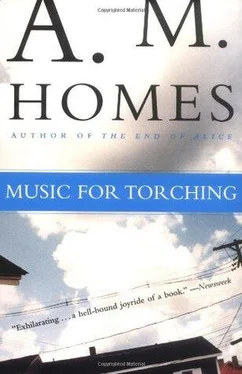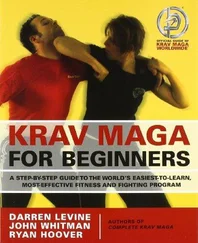Sammy wakes up. "Where am I?"
"You're right here at home," Elaine says.
"Is the door closed?"
"It's nighttime, and the door is closed," Elaine says.
She shakes Daniel's shoulder. "Come on, Scout, up to bed." Daniel babbles something about making a left turn at the what'd- ya-call-it tree, losing the route of the trail.
"You're talking in your sleep," Elaine says.
"No I'm not," he says.
She tucks both boys in and goes down the hall to her room.
They are home, back where they belong. Elaine hears the car pull in, the engine turn off, she hears Paul come into the house, she hears him whistling downstairs, making a drink. He comes up, offers the glass to her.
"Nightcap?"
"Pass," she says, pulling her nightgown over her head.
"Twelve-twenty and all's well," Paul says, unzipping his pants. "Kids asleep?"
"In comas," Elaine says.
"I'm so glad to be home," Paul says, sliding in next to her.
"Door locked?" Elaine asks.
"Bolted, chained, and I threw the sofa in front just in case."
SUNDAY MORNING. Two dogs knock over a trash can, dragging garbage across the grass. Squirrels jump from tree to tree, a cat slinks around the corner of the house, someone's sprinkler kicks on-things bubble beneath the surface.
Elaine is awake, alert, vigilant. She hears everything: the cracks and creaks, the shifting of the foundation, the even engine of Paul's breathing. She has been up half the night, afraid to go downstairs, afraid the cop is out there, watching. She had a strange dream and woke up thinking Paul was Pat. In the middle of the night, she sat up and took a look. Paul was Paul. The splash from the streetlight, the spill of the moon, gathered on Paul's shiny dome, giving his scrubbed skull a blue glow. A vein in his temple pulsed, his eye twitched. Elaine took a deep breath, turned over, and went back to sleep. She dreamed that every morning when she woke up someone different was in her bed: Pat, the cop, the workman with the broken fingers, the architect, Ted Talmadge. Every day someone new was pressed up against her-naked. Elaine dreamed she had no way of stopping it, she dreamed that she had no control.
Again Elaine woke up. Again she looked; still Paul. She got out of bed, walked down the hall, and checked on Sammy.
"Leave me alone," Sammy said in his sleep.
Standing over him, she cast a shadow across the bed, a dark cloud over the comforter's blue sky. She stepped back.
"Don't close the door," he mumbled.
"Door's open," Elaine said, leaving.
Elaine went back to bed and lay there, waiting.
A noise: tires, the slam of a car door, the sound of her mother's voice. "Try the kitchen door."
Her father asking, "Do you have a key?"
"If I had a key, why would I send you around to the other side of the house. Blow the horn."
There is a single shy beep, simultaneously splitting the air and struggling to be unobtrusive.
"More," her mother says.
The beep is followed by a second solid blast.
Sammy staggers into Elaine's bedroom. "Grandma's here," he says. "She beeped right under my head."
"Why don't you go down and let her in?"
He is in his pajamas, rubbing his eyes, a sleepy boy. "I don't like her," he says. "She squeezes too hard."
The horn blows again.
"I'm not here," Sammy says, crawling in next to Paul, pulling the covers over his head.
"All right," Elaine says. "All right."
Paul stirs in his sleep.
"My parents are here," she tells him. He rolls away.
"House of sleepyheads," her mother says, pushing ahead of her father and into the house. "Good thing we didn't call before we came." "It's Sunday morning," Elaine says.
"It's nine o'clock," her mother says.
"We brought brunch," her father says. He is holding bags of groceries and a white bakery box tied with string.
"You've already been to the store?" Elaine asks.
"I'll tell you a secret," her mother says. "When you get older, you need less sleep."
"You need less of everything," her father says, putting the bags down.
"I brought your father so you can see for yourself," her mother says.
"See what?"
"Exactly," her mother says. "I want you to see how he is." She says it right in front of him.
"She thinks I am something," her father says. "The fact is, I just am, and that annoys her."
"The kitchen, by the way, looks very nice. Do you want to show your father what you're doing with the house?"
"We're not finished," Elaine says.
"Well, I want him to see something," her mother says, leading her father into the living room. "Look at this sofa, these pillows. Everyone has to do something about where they sit." She sits down, patting the cushion next to her. He sits beside her. "You can feel it," she says. "The stuffing goes, you sink lower and lower until it takes a crane to get you out. This is how it is on our sofa. Some Saturday night I'm going to sit down and not be able to get up-it makes me think I'm an old woman."
"You are an old woman," her father says.
"Not that old." She peels herself off the sofa with some difficulty and goes back into the kitchen.
Elaine sits next to her father. "You haven't been here in a long time," she says, realizing that she hasn't seen him in months. He looks older and a little frail.
"I like it at home," he says. "Your mother always wants to get out of the house. She just wants to go, I don't think she cares where. Go, I tell her. Go without me. For thirty-five years I left the house every morning; now I want to stay home."
"He just sits there. Some days he just sits all day," her mother throws in from the kitchen.
"So what if I sit? What's wrong with sitting? I earned the right to sit."
"You didn't call me yesterday after I left," her mother says to Elaine. "You have to be careful what you promise people."
"I didn't say I would," Elaine says.
"You said, 'I'll talk to you later.'" Her mother goes on, "I call you every day."
"You call me because you want my attention-you want a lot of my attention."
"That's my way of paying attention. You're always disappointed in me, I can never do enough."
"The feeling is mutual."
"Elaine, I am the way I am. I'm almost seventy years old. The only way I'm going to have a personality transplant is if, God forbid, I have a stroke; otherwise, this is what you get. Would you like some coffee? I brought some of my own from home. I grind the beans every day."
"Are you depressed?" Elaine whispers to her father, hoping her mother won't hear.
He bends toward her. "How would I know?" he whispers back.
Читать дальше












